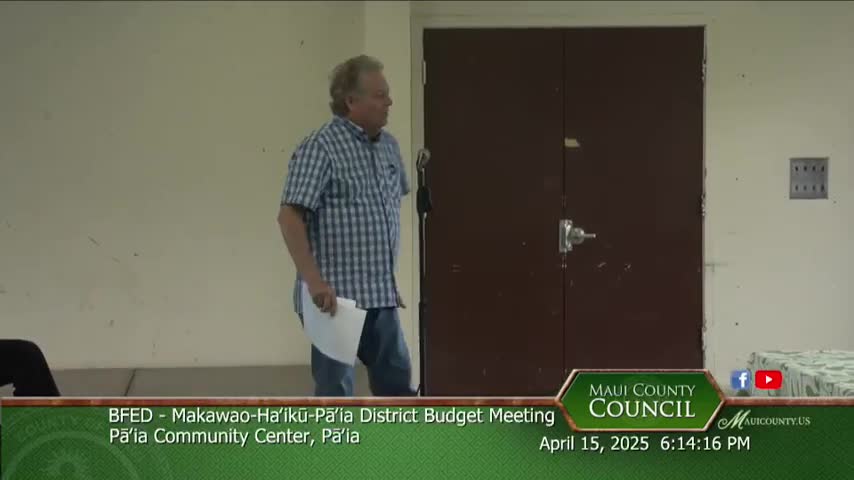Residents and nonprofits urge county to fund youth programs, farmer support, homeless services and conservation
Get AI-powered insights, summaries, and transcripts
Subscribe
Summary
At a Paia budget hearing, more than 40 residents and nonprofit leaders urged continued or increased county funding for arts and youth programs, STEM and film initiatives, farmer support, food access, behavioral-health services, homeless outreach and conservation programs; several speakers named line-item amounts and program requests.
Dozens of residents and nonprofit representatives testified at the Maui County Budget, Finance & Economic Development Committee meeting in Paia with a range of budget requests and community concerns, including support for arts and youth education, farmer services, food-security programs, homeless outreach, conservation and resilience projects.
Public speakers identified specific asks and described services they provide to Maui residents. Highlights include:
- Arts and youth programs: Will Spence testified in support of Hui Nui Au’s request for $50,000 for the Art with Aloha program and $75,000 for youth-and-family arts education outreach. Several speakers emphasized arts programs’ role in mental-health support and outreach to Lahaina fire-affected families.
- Maui Economic Development Board and STEM Works: Students and program alumni including Chelsea Ann Miguel, Madison Pacion and Cameron Rogers described STEM Works programming that introduces students to science, engineering and health careers. Brian Kohn, the county film commissioner, said a proposed line item through MEDB totals $345,000 for fiscal year 2026 — about $250,000 for office and staff and $95,000 for a new Wailuku Film Festival. Testimony emphasized workforce pathways and the role of STEM and creative industries in economic diversification.
- Farmer support and local food: Caprice Mallet and Georgia Pinsky (co-founder and executive director, Maui Farmer Support Network) urged continued funding for farmer coaching, tool libraries and Laulima (community) work days. Pinsky said the organization hopes for an annual operating budget of about $300,000 to meet demand. Grow Some Good requested $150,000 to support farm-to-school garden education and classroom kits across Maui, Molokai and Lanai.
- Youth services and after-school programs: Boys & Girls Club leaders including TJ Daya and youth speaker McKenna Fujita described daily after-school programs, workforce-readiness stipends and STEM access for more than 1,200 children countywide; they asked for continued support. Several speakers credited club programs with keeping students safe and providing career skills.
- Behavioral-health and homeless services: Nicole Hokowana of Maui Behavioral Health Resources summarized services at Aloha House, Malama Family Recovery Center and Maui Youth and Family Services, and noted Aloha House is building a 12-bedroom dormitory with construction scheduled to break ground in May and a projected 200-day construction timeline to complete the dorm. Holomua Outreach’s Mo’i Kavaakoa requested $75,000 for a workforce-development program that pairs outreach clients with paid work, and described plans for related benefit-corporation enterprises. Maui Rescue Mission representatives described mobile shower-and-laundry trailers (the most recent trailer cost about $150,000) and urged continued support for mobile services that provide showers, laundry and other hygiene resources.
- Conservation and environmental monitoring: Representatives from Maui Nui Marine Resource Council and Malama Hamakua Maui asked for larger county allocations for reef-friendly landscaping, water-quality monitoring and large-scale litter and abandoned-vehicle removal at the Hamakua Open Space Preserve. The marine group asked the council to increase its allocation from about $225,000 to $525,000 to expand monitoring, restoration and staff support.
- Broader concerns: Multiple speakers raised worries about expected federal funding cuts and urged the county to avoid cutting local programs that serve vulnerable residents. Shay Chan Hodges and others urged the council to consider taxing second homes or higher-value nonresident properties more heavily to protect local services. Testimony also included appeals for road-safety improvements, expanded Head Start hours and continued support for Haiku Head Start and other early-education programs.
No committee votes were taken during the public-testimony portion. Committee members thanked speakers and closed public testimony; members said they would continue budget deliberations back in chambers.
Ending: The meeting closed after public testimony; speakers left written testimonies and many stayed to discuss issues one-on-one with council members.
